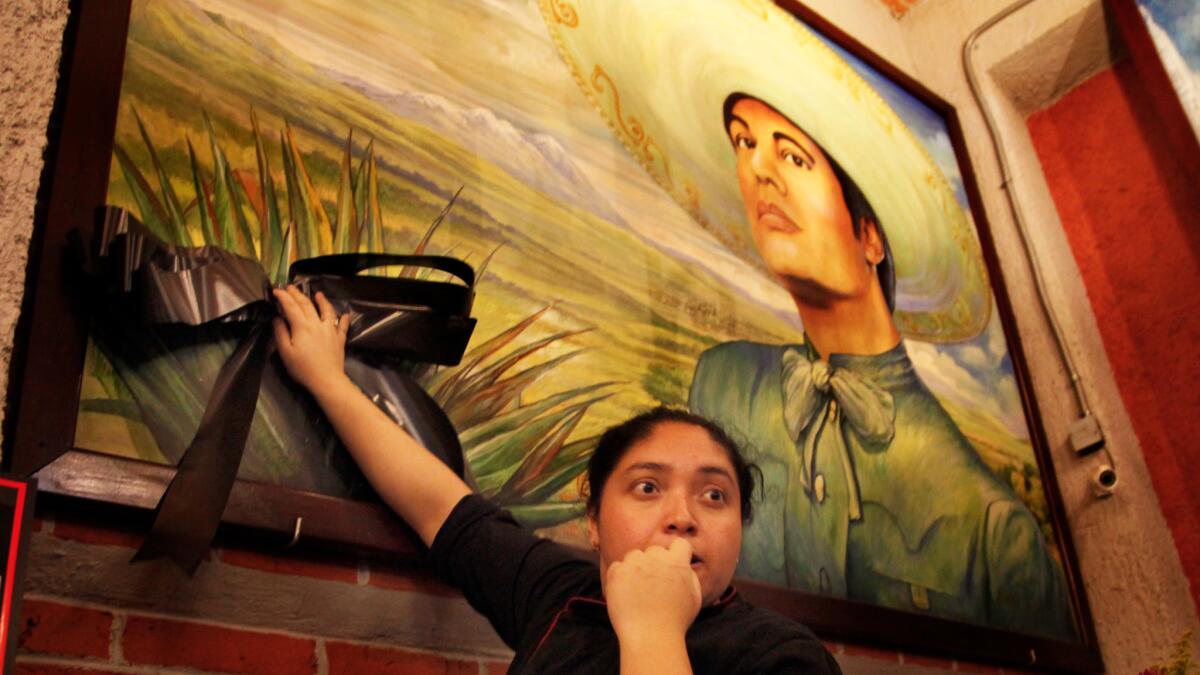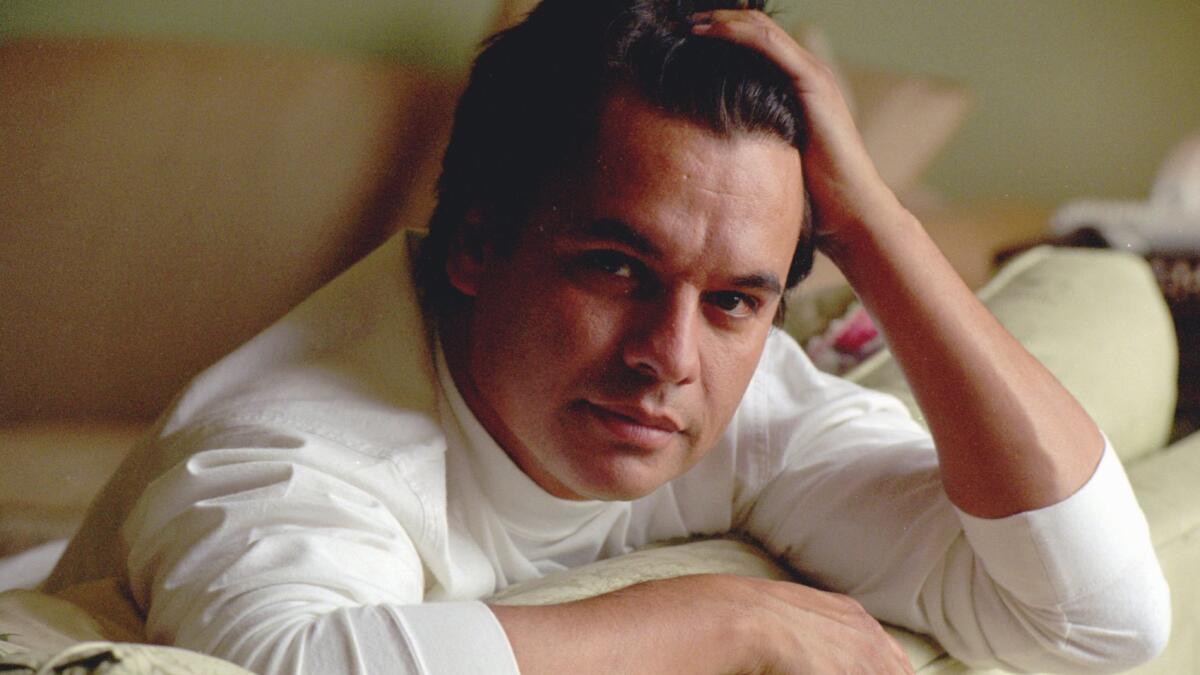Juan Gabriel was a songwriter who knew how to channel the struggles of modern life and the hurt of the wounded

- Share via
It’s a song that begins as a whisper before turning into a wail.
“Hasta Que Te Conocí” (“Until I Met You”), first performed by the Mexican singer Juan Gabriel in the mid-1980s, begins with a quiet moment of reflection — a person, unnamed, taking account of their romantic past as a lone guitar plucks along in accompaniment: “I lived so differently / Something beautiful / Something divine / Full of happiness.”
“I was very happy, I lived so well,” the song continues — pausing dramatically just before the bottom drops out. “Until I met you.”
And at that point a well of instrumentation — violins and guitar and guitarrón, the deep-bodied Mexican six-string — rise to greet the singer’s voice, the voice of a narrator who is about to spill some pain:
“I don’t want you to tell me / Was it worth it or not / To have met you / Because I don’t believe you anymore.”
Juan Gabriel, who died of a sudden heart attack in Santa Monica on Sunday at the age of 66, was one of the most prolific songwriters of the 20th century. His life and lyrics embodied the triumphs and struggles of contemporary Latin America, of bustling metropolises teeming with hybrid cultures.
He also knew how to channel heartbreak in almost uncanny ways. “Hasta que te conocí” was one of his smash hits — a torch song that he, and various singers from around the world, have performed in the decades since it was written.
The original 1986 version leans pop. But a favorite rendition comes from an undated live performance, easily found on his YouTube page (where it has almost 64 million views) that best captures the somber allure of his lyrics.
As the song moves along and the musical accompaniment grows in volume and depth, adding trumpets, drums and a full-blown symphony orchestra, Juan Gabriel — decked out in a dramatic black-and-gold tasseled number — emits a series of mournful cries that evoke the agony of love gone savagely wrong.
In a Tweet following the announcement of Juan Gabriel’s death, on Sunday afternoon, Mexican actor Gael García Bernal wrote that his songs carry on “the grotesque (beauty) in love.”
When Juan Gabriel, the man born Alberto Aguilera Valadez, passed away over the weekend, Mexico lost one of its most important troubadours, one whose voice has resonated at weddings and quinceañeras throughout the continent. More importantly, he was a figure whose narratives emerged not from the past, but squarely from the Latin American present.
Much Mexican music of the first half of the 20th century was dominated by a national identity rooted in the rural. Early songs by the internationally renowned songwriter José Alfredo Jiménez (1926-1973) -- such as “El Rey” (“The King”) and “La Media Vuelta” (“The Half Turn”) -- were about men who ruled their kingdoms, real or imaginary, with iron wills and impassivity. They are songs that taste of dust kicked up by galloping horses and echo with the clink of spurs on rough, wooden floors.
But the music of Juan Gabriel spoke to another, more modern reality. His first hit song, from 1971, “No Tengo Dinero” (“I Don’t Have Any Money”), opens with a young man walking down a city street with his love, explaining that he can’t get married because he is too poor. “I don’t have money or anything else,” go the lyrics, “The only thing I have is love to give.” The accompanying tune is relentlessly pop.
“El Noa Noa,” from 1980, with its country twang, pays tribute to the Noa Noa, an old disco the singer used to perform in as a young man in Juarez, the city where he grew up. Likewise, “Juárez es el Numero Uno” (“Juarez Is No. 1”), from 1986, sings the praises of the border city in lyrics such as, “Juarez is the number one / a border where you find your most profound loves.”
If for much of the 20th century Mexican music had seemed steeped in the culture of the rancho, Juan Gabriel’s songs evoked the feel of the city — of traffic and factories and discos and bars, where rock and pop and the Mexican ballad all got stirred into one.
He sang cheesy disco pop, but he could belt out a Mexican ballad like nobody’s business. He dabbled in regional styles such as brass-heavy banda but also did a Spanglish cover of Creedence Clearwater Revival’s “Have You Ever Seen the Rain?”
And in his lyrics, he celebrated the border (especially his beloved Juarez) — those not-quite-Mexico-not-quite-the-U.S. settlements that the Mexico City cultural establishment likes to view, from a distance, with haughtiness and disdain.
“Juan Gabriel was not a folkloric composer,” musicologist and composer Aurelio Tello told the Mexican daily El Universal in the wake of the singer’s death, “he was more of the urban layer,” and because of it, “he became a musical icon of at least the last 40 years.”

While the poetic power of Juan Gabriel’s lyrics cannot be underestimated, part of the appeal was the man himself.
He was an orphan who, as an adult, went and bought the orphanage he had once lived in and turned it into a music school. He was a dark-skinned mestizo in a media environment that prizes whiteness above all. He was flamboyantly effeminate (the man loved a good cape) in a culture where to call a man gay is among the lowest of insults. He was the ultimate underdog-turned-smash superstar.
When he emerged, in the early ’70s, the Latin music airwaves were still dominated by traditional Mexican music as sung by figures such as Vicente Fernandez, or the cool romantic stylings of vocalists such as the Brazilian Roberto Carlos and Spain’s Julio Iglesias.
Like his fellow crooners, Juan Gabriel also penned paeans to affairs of the hearts — from “Amor Eterno” (“Eternal love”) to “Yo No Nací Para Amar” (“I Was Not Born to Love”), the latter offering a particularly resonant cry of loneliness.
But his narratives contain myriad nods to the hard-working everypeople who power Latin American cities: the street vendor, the domestic servant, the construction worker. In one song, he celebrates the “Mexican eyes” of a lover. In another, he offers the escape of dancing the night away at a thumping neighborhood bar.
He may have performed at Mexico City’s Fine Arts Palace, but everything he represented was resolutely urban and working class.
Over the course of his career, Juan Gabriel penned, by some estimates, as many as 1,500 songs — making him one of the great Latin American songwriters. Some of these he made famous himself. Others have been inserted into the popular culture by other performers, such as Spanish chanteuse Rocío Durcal (a muse of the songwriter’s), Mexican ska rockers Maldita Vecindad and Puerto Rican salsa singer Marc Anthony.
(Marc Anthony, who owes a stylistic debt to Juan Gabriel when it comes to the painful love ballad, paid tearful tribute to the singer at a concert in New York on Sunday night.)
During his lifetime, Juan Gabriel never revealed much about his own affairs of the heart to the press — likely because 1970s Latin America wasn’t ready to deal with his presumptive homosexuality (an open secret that, in typical Latin American fashion, everyone acknowledged by choosing to not acknowledge it). But revelations by tell-all-writing exes have over the years pointed to heartbreak, loss and difficult love affairs.
In what way these personal tribulations might have been fuel for his work is impossible to know. But what is certain is that Juan Gabriel’s lyrics had a certain visceral quality, channeling the bewilderment of a wounded lover in ways that can fill your heart with a dull ache.
“You are the sadness of my eyes / which cry in silence for your love,” go the opening lines of “Amor Eterno.”
This wasn’t some singer crooning about pain from a distance. This was a man coming to terms with what he felt — which is why his work resonated so widely.
In the lyrics of Juan Gabriel, the hurt was always real.
Sign up for the Essential Arts & Culture newsletter »
Find me on Twitter @cmonstah.
ALSO:
Juan Gabriel, superstar Mexican singer and songwriter, dies at 66
Op-Ed: As a boy, I was taught to ridicule Juan Gabriel. As an adult, I revered him
'No, that can't be true': Angelenos react to the death of Mexican crooner Juan Gabriel
The biggest entertainment stories
Get our big stories about Hollywood, film, television, music, arts, culture and more right in your inbox as soon as they publish.
You may occasionally receive promotional content from the Los Angeles Times.








